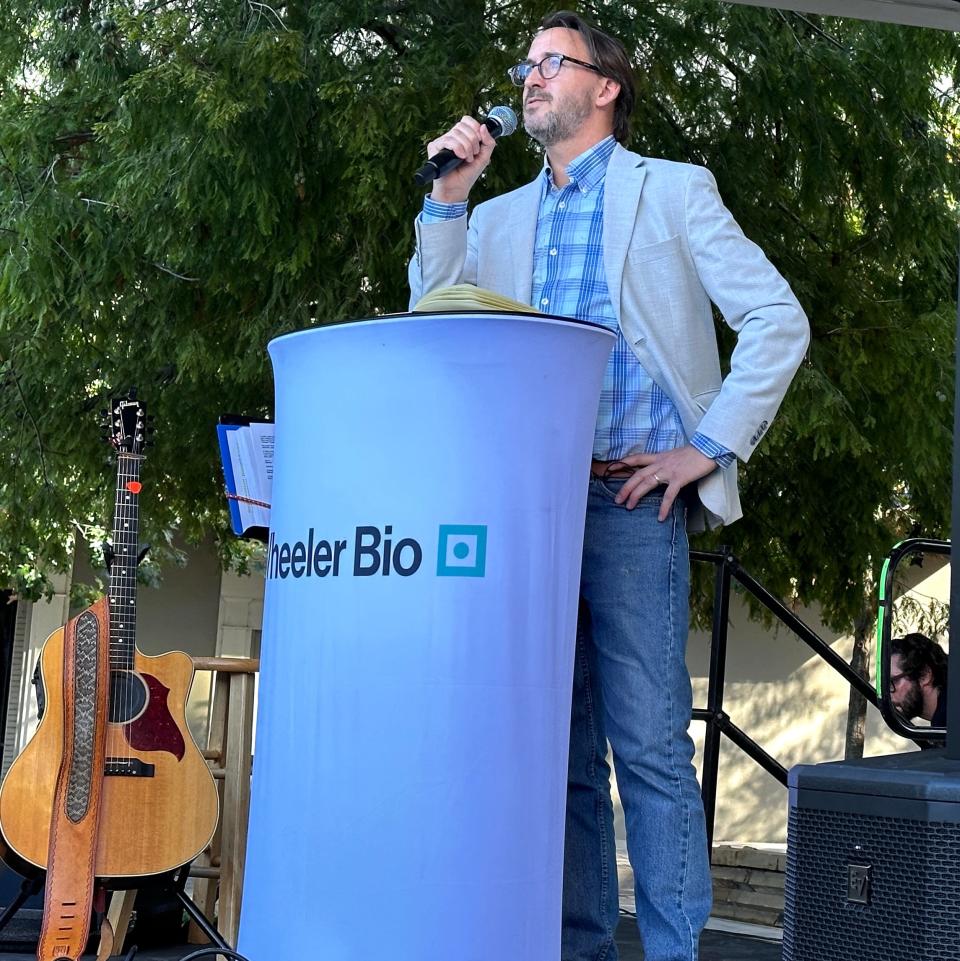Why domestic U.S. production for lifesaving drugs is mandatory or innovation will die | Guest
Editor’s Note: The BIOSECURE Act is scheduled for a U.S. House Oversight and Accountability Committee mark-up on May 15 led by Rep. Brad Wenstrup (R-Ohio).
The U.S. Congress must move the BIOSECURE Act forward to create a more competitive landscape and level playing field for U.S. biomanufacturers to better meet the needs of health care innovators.
Venture-backed, early-stage biotechnology companies that emerge from U.S. investment are facing ever increasing research and development costs and subsequent board pressures to offshore their outsourcing to low-cost providers of R&D manufacturing services (CDMOs).
Biotechnology harnesses the power of biology to drive innovation in services and products, contributing to economic growth and workforce development while promoting improvements in quality of life and environmental sustainability. This economic activity, known as "the bioeconomy," is pivotal in shaping our future. The COVID-19 pandemic highlighted the critical role of biotechnology and biomanufacturing in the rapid development and production of essential diagnostics, treatments and vaccines, safeguarding populations worldwide.
More: OKC innovation district gets $35M grant to cut dependence on foreign pharmaceuticals
The biotechnology industry requires fast and nimble R&D manufacturing to create enough clinical trial materials for initial human testing (which is where value in biotech is created) to look for benefits and risks in the treatment of cancer, autoimmune disease, cardiovascular disease and infectious disease, among many others.
It all starts with clinical-scale biomanufacturing to prove safety in humans and garner some evidence of efficacy or some therapeutic benefit. We, as an industry and ecosystem, must give these molecules — and their developers — a better chance of achieving early clinical milestones without needing reckless outsourcing. The main impediment to U.S. innovation lies in the system(s) we have created to allow Chinese manufacturers a free pass to drug introduction and to leverage or “game” our U.S. system of drug discovery. They even use U.S.-based lobbying to gain this unfair advantage.
As the CEO of the Biotechnology Innovation Organization (BIO) stated recently in March:
"Our adversaries abroad have stated that they intend to become the biotechnology center of excellence in the world," BIO CEO John Crowley said in a statement. "America and our allies cannot let this happen. Securing and advancing our preeminence in biomanufacturing will be one key component of a multi-prong approach to secure and advance this strategic imperative in biotechnology.”
At the same time, former BIO member WuXi AppTec has used the BIO trade group, according to BIO's own information, to lobby for specific U.S. legislation that favors offshoring our biotech industry.
The BIOSECURE Act is a bill in Congress that aims to prevent Chinese manufacturers from accessing U.S. federal funding and keep U.S. taxpayer dollars out of foreign adversary biotech companies of U.S. national security concern. The bill specifically names Chinese biotechs, including WuXi, as targets. We must work as Americans to ensure this bill passes. The Senate Committee on Homeland Security has sent this bill to the Senate Floor and a House companion now has new bipartisan co-sponsors.
The BIOSECURE Act claims these foreign companies pose a risk to U.S. national security by “engaging in joint research with, being supported by, or being affiliated with a foreign adversary’s military, internal security forces, or intelligence agencies.”

OKC to build new biotech industry here
Here is how we arrived at this place: Our own U.S. private market in biotechnology did not keep up and develop competitive offerings and the U.S. government did not build or invest in biomanufacturing capacity either; whereas the Chinese government did so.
Today, compelling, cost-effective capacity solutions are needed in order to reduce the offshoring of biotechnology, otherwise, innovation will be too expensive. Our company, Wheeler Bio, is building out clinical capacity in Oklahoma City and making our process open-source so that downstream scale-up is affordable.
Health care investors are showing renewed interest in biopharma following the long, uncertain “pandemic biotech bubble.”
The U.S. pharma industry (post-pandemic) is growing wary of offshore supply chains, which is driving a renewed interest in using domestic suppliers to support the development and manufacture of drug substance.
The BIOSECURE Act is finally encouraging U.S. biotech firms to select domestic CDMOs (contract development and manufacturing organizations).
Increased regulatory acceptance of compressed CMC (chemistry, manufacturing and control) development strategies is leading to deferral of major bottleneck steps and opening the gateways to innovation.
We call on the U.S. Congress to move the BIOSECURE Act forward to create a more competitive landscape and level the playing field for U.S. companies to save lives through our domestic innovation. We can build it right here in OKC.

Jesse McCool is the CEO of Wheeler Bio in Oklahoma City and building out lab space in the Convergence center.
This article originally appeared on Oklahoman: BIOSECURE Act would keep US funds away from Chinese manufacturers
